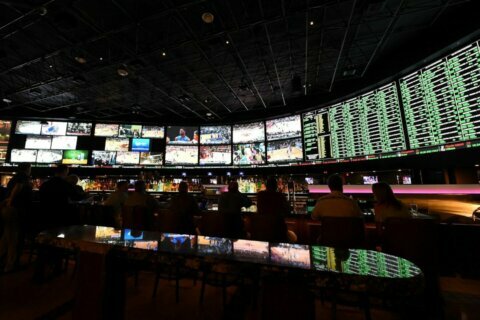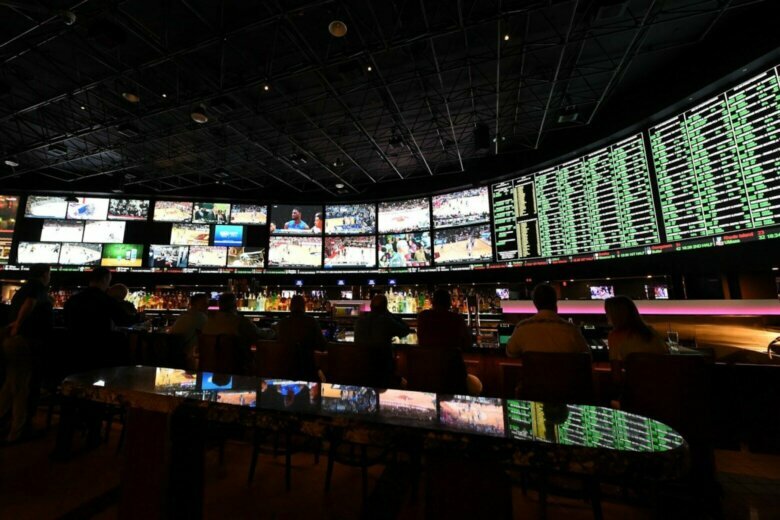This article was republished with permission from WTOP’s news partners at Maryland Matters. Sign up for Maryland Matters’ free email subscription today.

This content was republished with permission from WTOP’s news partners at Maryland Matters. Sign up for Maryland Matters’ free email subscription today.
By a margin of 2:1, Maryland voters approved a referendum to legalize sports gambling in November. The ballot question carried all 23 counties and Baltimore City.
It now falls to state lawmakers to determine how the state will implement legalized sports wagering. The process of filling in the details will likely become one of the most high-profile and heavily-lobbied issues of this year’s General Assembly session, those close to the process say.
Although the state Senate approved a detailed gambling measure unanimously last session (Senate Bill 4), the legislation died in the House of Delegates. Lawmakers said they begin this year’s debate with a blank slate.
“I prefer to have the people with differing opinions sitting at the same table, arguing why their position is stronger before the lawmakers who are going to make the decision,” said Sen. Guy J. Guzzone (D-Howard), chairman of the Senate Budget and Taxation Committee, in an interview.
Guzzone pointed out that the Senate’s 2020 bill not only authorized the statewide vote on sports gaming but also dictated where and how the gambling sites would be set up.
When a dispute arose with the House over whether minority business-owners would have access to gambling licenses, the legislation was stripped of everything except the referendum.
How to guarantee that minority business-people get included in the distribution of licenses looms large over the debate that is about to begin.
“The biggest nut to crack will be how do you handle the minority business piece,” said Del. Dereck E. Davis (D-Prince George’s), chairman of the House Economic Matters Committee.
“There are a number of members of the Legislative Black Caucus of Maryland who are deeply disappointed with how it played out with medical cannabis, and there is a steely determination that there won’t be a repeat of that,” he added.
Sports betting is not nearly as lucrative as casino gambling. Nonetheless, it is the next frontier in gaming, and firms seeking licenses have formed a long line at the State House door.
Most, if not all, of the state’s existing casinos, race tracks, pro sports teams and off-track betting sites are expected to seek a license for on-site gambling and/or a “skin,” as online wagering platforms are called. All have deep pockets and well-connected lobbyists, who will be deployed to promote their interests in the State House in the weeks ahead.
Other issues that need to be nailed down:
- How many on-site betting licenses will Maryland offer?
- How will they be allocated?
- How many “skins” will be authorized?
- How much will the state charge for each license and skin?
- What will the tax rate be?
- Will betting on college sports be allowed?
- Will teams that win licenses be allowed to take bets on their own games?
Guzzone said he will establish a workgroup to hash out the various questions that need to be resolved.
Analysts expect sports betting in Maryland to take in around $18 million per year.
“I really feel like the voters of Maryland made it clear that they’d like sports betting to move forward,” said Sen. Craig J. Zucker (D-Montgomery), the chief sponsor of last year’s bill.
The lawmaker noted that casino-generated revenue dropped dramatically in 2020 because of the pandemic. That meant fewer dollars flowing into the state’s educational trust fund.
“Anything that we can do to get sports betting up and running to help close some of that budget gap is really going to help fund our educational system,” he said.
While lobbyists representing the heavy hitters — Maryland’s casinos, racing interests and pro sports teams — will likely dominate the legislature’s upcoming debate, there are smaller players in the mix as well.
Long Shots, a bar in the Clarion Hotel in Frederick, has hired lobbyist Bruce C. Bereano as part of its push to get a license.
From Bereano’s perspective, it’s important that there are options for “regular folks, who don’t have to get all dolled-up all the time to go participate in a relaxed peaceful way.”
Maryland lawmakers hope the rollout of gambling will recapture activity that is currently being lost to neighboring states and illegal betting.
Nineteen states — including Maryland neighbors Delaware, Pennsylvania, the District of Columbia and West Virginia — have “live, legal” sports betting, according to americangaming.org. In six more states wagering on athletic contests is legal but not yet operational.
Four other states are expected to consider legalizing sports betting this year.
Zucker said that if the legislation passes this session, Marylanders could begin to legally place their first bets this summer.
Editor’s Note: The graphic on this story has been updated with additional information.
Josh Kurtz contributed to this report.
bruce@marylandmatters.org








